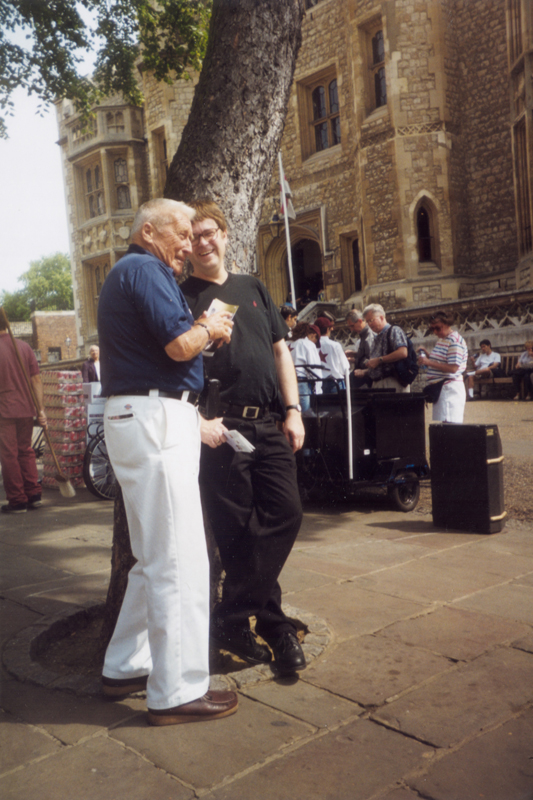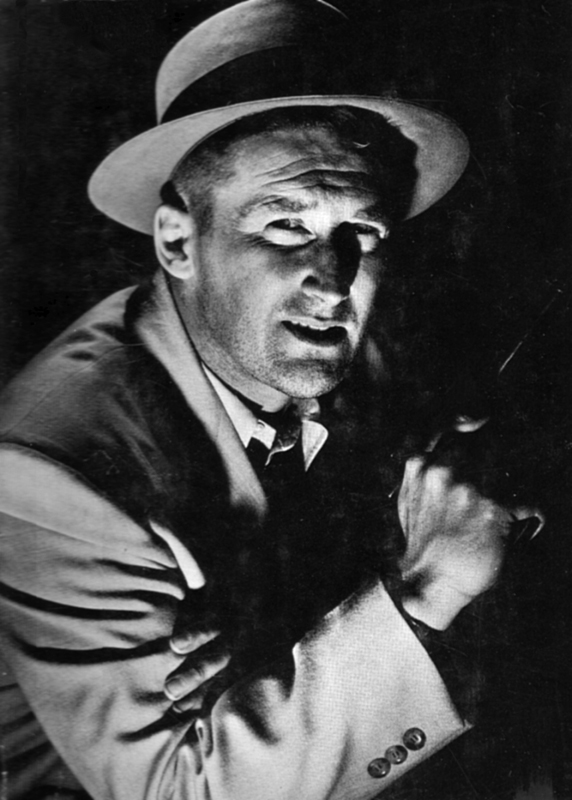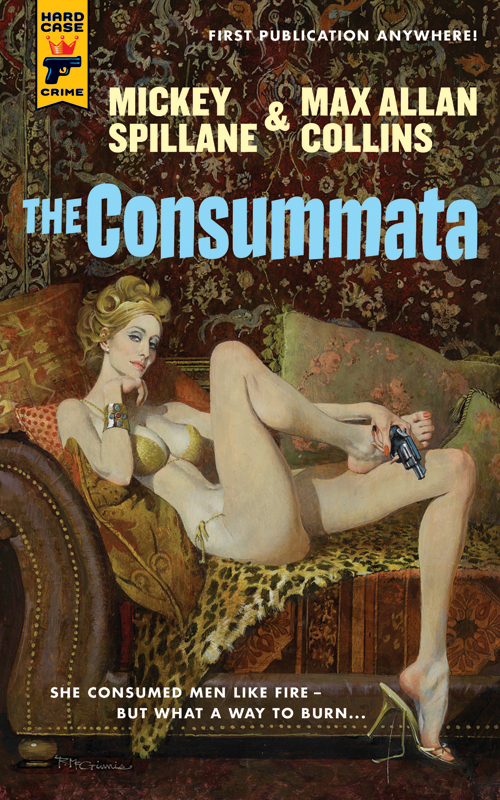Max Allan Collins and THE CONSUMMATA
I became a fan of Max Allan Collins through reading his work. Road To Perdition many years ago and the enjoyment I felt has returned when I read THE CONSUMMATA. THE CONSUMMATA, written by Mickey Spillane and Max Allan Collins, is a great Hard Case Crime novel about Morgan The Raider, a man wanted by the law over the disappearance of 40 million dollars, trying to return $75,000 stolen from Cuban Exiles who saved his life. A mission that should have been simple but instead complicated by mystery, beautiful women and dead bodies. And who exactly is The Consummata?
Mickey Spillane began this exciting tale in the 1960s and it is now completed by close friend Max Allan Collins. We spoke to Mr. Collins about what it’s like to write the follow-up to THE DELTA FACTOR, a bestseller and also a film, as well as his friendship with Mr. Spillane.
*****
How would you describe your experience putting together THE CONSUMMATA? How was the experience different from other novels you have worked on?
I was working from a hundred-page manuscript from Mickey Spillane’s files, working to flesh it out and expand and complete it. Having worked on several other unfinished Spillane manuscripts, I already had the approach down — I try to extend the Spillane material about two-thirds of the way into the book, to weave my voice with his…actually, “my” voice is my attempt to work in Mickey’s voice…which means by the time I’m out of Spillane material, and I’m on my own, the reader isn’t likely to pick up on the difference.
Some of Mickey’s unfinished manuscripts have included plot and character notes, but all I had on THE CONSUMMATA was the one-hundred page manuscript. That proved to be plenty, however, because Mickey had brought all of the characters onto the stage and had set up all the plot threads. I should also mention that I spent a lot of time with the previous Morgan the Raider novel, THE DELTA FACTOR, reading it again and again, marking up a copy like a kid preparing for a test.
Without giving away too much, what were your favorite moments in writing THE CONSUMMATA? What can fans of THE DELTA FACTOR expect to see in the continuing adventures of Morgan The Raider?
I like the last several chapters, because there are some nice surprises, and some really effective action. I also like the relationship between the protagonist, Morgan, and a brothel madam, Bunny, who has very much been around — there’s a violent action sequence written almost entirely by Mickey that flows out of one of those scenes, and it’s terrific.
Some readers worry, like the last works of Dorothy Sayers, J. R. R. Tolkien or even recently Robert Jordan, that when another writer picks up the story where the original author left off, that it becomes an entire new work instead. What would you say to hardcore Spillane fans who may be worried of this?
First of all, I present these novels as collaborations — the material was entrusted to me by Mickey with that in mind. I don’t pretend that these are exactly how Mickey would have done it, though I obviously endeavor to be true to him and the material. Where my continuations differ from those you mention — in some cases, as with Jordan, the author did leave notes and other material behind — I am always working with substantial Spillane material. In the mystery field, I think few would argue against the proposition that I know Mickey’s work inside and out, and that there was some other author more appropriate. And in my case, the author himself chose me for this role, in the final weeks of his life. That makes this
work an honor, a privilege and and a duty.
Part of my approach is not to introduce new character or plot elements — I use the characters Mickey introduced or at least mentioned in his portion, and follow up on plot threads that he provides. Everything I do grows out of his work.

What do you think makes Morgan the Raider such an interesting character? How does he stand out from Spillane’s other main characters, like Mike Hammer?
When Mickey presented Morgan in THE DELTA FACTOR in 1967, with the character introduced with considerable fanfare as his new and greatest character, a number of critics who often had reviled Spillane and Mike Hammer really took to this modern-day pirate. Morgan is just as tough as Hammer but he is probably better-natured, more like Mickey himself was. There’s a lot of romance in Morgan — like Richard Kimble, he’s a fugitive, so pursuit by law enforcement, local and federal, is hanging over him even as he endeavors to solve a mystery and nail a bad guy. He’s a Robin Hood. That’s always appealing — he’s as much in the tradition of the Saint as he is Mike Hammer.
Mr. Spillane’s works have endured the passage of time and are still popular with fans of that genre. What themes do you think emanate from his works that are still relevant to our society today?
Mickey’s recurring theme is vengeance, and that doesn’t sound very nice, but who among us don’t want to get even with those who torment us? And who among us isn’t occasionally tormented? But that’s not what makes Mike Hammer resonate — it’s that he seeks revenge for a dead friend, in I, THE JURY, and in other novels seeks vengeance not just for other murdered friends but for innocents he’s encountered, who deserved a better shake. The innovation Mickey came up with, which is imitated even now everywhere you look, is the hero who uses the bad guy’s methods against the bad guy.
The vengeance aspect made Mike Hammer the first truly emotional detective. Sam Spade was as cold a fish as Hercule Poirot. Phillip Marlowe is a detached chess player. Mike Hammer is a lunatic who is going tear the bad guy’s throat out. Similarly, Hammer gets emotionally involved with women. He was the first series character to break down that barrier — the private eye who slept with the women he desired. And, for his day, Mickey wrote very hot sex scenes…though it’s the scenes of violence that remain shocking even now.
I’ve read that Spillane appointed you to finish his works before his passing. How did your friendship with Mr. Spillane come to pass?
I was a fan who often defended Mickey’s work in articles and essays and on panels at conventions. Because of that, in 1981, the Bouchercon — the big mystery convention — asked me to be the liaison between the convention and Mickey, who was a special guest of honor. We hit it off and became friends. I visited him once a year or so at his home in South Carolina, and we did numerous projects together — co-edited around ten anthologies, created the MIKE DANGER science-fiction comic book together, plus he appeared in two indie movies I directed and was the subject of a documentary I did. That 1999 documentary, MIKE HAMMER’S MICKEY SPILLANE, is featured on the new Criterion Collection DVD and Blu-ray release of KISS ME DEADLY, the great film noir based on Mickey’s novel.
The plot deals with the Cuban exiles of Miami; would you say that the novel is exploring political or social themes? What of ourselves or our society do you and Spillane want to show?
Mickey and I did not share the same political beliefs. He was way right of center, and I’m at least somewhat left of it. But it’s my responsibility, writing Hammer or Morgan, to reflect the beliefs of the characters and their creator. On the other hand, I have done a lot of research about the Cuban situation, preparing for my Nathan Heller novels, the current BYE BYE, BABY and the forthcoming TARGET LANCER, which are part of a cycle of historical thrillers revolving around the JFK and RFK assassinations. So I am well aware that the CIA specifically and the USA government in general really sold out the Cuban exiles in the Bay of Pigs and thereafter.

8) What would you say makes THE CONSUMMATA differ from other Spillane’s female characters?
THE CONSUMATTA has, I think, an impressive array of strong female characters. That’s not unusual in Mickey’s work, in fact it’s fairly typical, but THE CONSUMMATA is a striking example of his ability to present women who are tough-minded and the equal of the strongest man. Perhaps the most unfair characterization of Mickey’s work, over the years, has been calling him and his heroes misogynist. In 1947’s I, THE JURY, Mickey introduces Mike’s secretary Velda — only she’s not just his secretary, but partner, herself a licensed P.I. who is shown to rival Hammer in toughness. In later novels, we learn she had been a policewoman and an espionage agent. Spillane women are not just “dolls” and “babes,” even if his heroes tend to address them that way, with wry affection. Morgan’s great love is Kim Tracy, a spy and every bit his equal.
What is next on your agenda now that this book will be released in early October?
I’m about to work on my draft of a non-fiction book about the Mickey Spillane-derived films and TV shows with my friend Jim Traylor — we collaborated on the Edgar-nominated ONE LONELY NIGHT: MICKEY SPILLANE’S MIKE HAMMER in the early ’80s. Then I’m doing another Hard Case Crime novel, the third in my Jack and Maggie Starr series, which deals with the history of comic strips and comic books. This one will be called SEDUCTION OF THE INNOCENT.
One last question, as a comic book nerd I wanted to ask you: do you think we¹ll ever seen the return of Mike Danger, a comic book character that you and Spillane were a part of?
Hard to say. The rights are kind of tangled up. Big Entertainment co-owns the character with Mickey’s estate and myself, and they show no interest of doing anything with it. And Miramax tied some rights up when they bought it for a film they never made. There’s actually a draft of a Mike Danger novel, but it’s ensnared in this same tangle of rights. We’ll see.
*****





1 thought on “Max Allan Collins and THE CONSUMMATA”